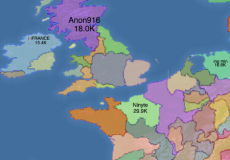
Dummy Nation
Advertisement
Dummy Nation is a strategy and management game that simulates international politics, economics, and conflict on a global scale. The player assumes control of a country and directs its development across multiple sectors, including industry, research, defense, and diplomacy. The main objective is to strengthen the nation’s position while competing with others in an interconnected world. Each decision affects economic stability, population satisfaction, and global standing, forming a network of consequences that define long-term success.
Advertisement
Similiar games
Dummy Nation is a strategy and management game that simulates international politics, economics, and conflict on a global scale. The player assumes control of a country and directs its development across multiple sectors, including industry, research, defense, and diplomacy. The main objective is to strengthen the nation’s position while competing with others in an interconnected world. Each decision affects economic stability, population satisfaction, and global standing, forming a network of consequences that define long-term success.
Gameplay And Decision Making
The gameplay in Dummy Nation focuses on planning and resource allocation. Players handle national budgets, infrastructure growth, and diplomatic relations with other states. The system operates in real time, requiring attention to both domestic issues and international developments. Policies such as taxation, production priorities, and military spending can shift the balance of power. The player must monitor metrics like GDP, population growth, and foreign trade to maintain stability. Failure to manage one area can quickly impact others, making every choice part of a larger strategic chain.
Core Systems And Management
Dummy Nation integrates several interconnected systems that determine overall performance. These include economic management, foreign relations, technological innovation, and defense strategy. Each of them influences the others, requiring balanced development rather than isolated focus.
Key systems include:
- Economic policy and industrial management
- Diplomacy, alliances, and international trade
- Military structure and defense readiness
- Research and technological advancement
The interaction between these elements ensures that outcomes are shaped by player priorities and the external behavior of rival nations.
Strategy And Progression
Progress in Dummy Nation is measured by influence, stability, and control of resources. Expansion through diplomacy or conflict leads to new challenges, such as maintaining support from citizens or managing scarce materials. The game rewards players who adapt to shifting global conditions and use strategy over aggression. Long-term success depends on anticipating economic cycles, forming beneficial partnerships, and balancing military presence with diplomatic credibility. No single playthrough follows the same course, as global behavior changes dynamically with each session.
Dummy Nation provides a framework for exploring how states function within a shared world system. It turns economic and political decision-making into a sequence of strategic experiments that test judgment and foresight. By linking domestic management to global relations, it demonstrates how every national choice can alter international balance. The player’s ability to observe patterns, manage risk, and coordinate multiple systems determines the final outcome. Through this structure, Dummy Nation transforms complex global interactions into a single, continuous simulation of control and consequence.
Discuss Dummy Nation


















